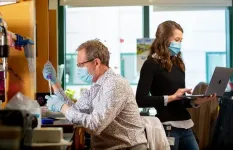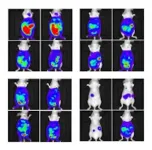Targeting drug-resistant breast cancer with estrogen
Dartmouth researchers achieve better long-term control of drug-resistant breast cancer growth in mice by switching between estrogen and anti-estrogen therapies. A new clinical trial will inform which patients may benefit from this strategy
2021-04-23
(Press-News.org) LEBANON, NH - Researchers at Dartmouth's and Dartmouth-Hitchcock's Norris Cotton Cancer Center (NCCC) hope to make estrogen therapy a more accessible treatment option for breast cancer patients who could benefit from it. Anti-estrogen treatments, which block growth signals from estrogen receptors (ER) in tumors, are effective treatments for ER+ breast cancer. But it is common for breast tumors to become resistant to anti-estrogen treatments over time. The research team, led by molecular biologist Todd Miller, PhD, and Nicole Traphagen, a PhD candidate in the Miller Laboratory, found that in mice, cycling between estrogen treatment and anti-estrogen treatment at a specific point in time can dramatically increase the duration of tumor regression.
The team's unconventional approach has exciting implications for breast cancer patients by suggesting that treating short-term with estrogen before anti-estrogen therapy resistance occurs, and then switching back to a more standard anti-estrogen therapy can better control tumor growth long-term. Traphagen and Miller have newly published their findings, entitled "High estrogen receptor alpha activation confers resistance to estrogen deprivation and is required for therapeutic response to estrogen in breast cancer," in Oncogene.
"Although we typically think of estrogens as feeding breast cancer growth, treatment with estrogens can actually induce tumor regression in some patients with anti-estrogen resistant breast tumors," says Miller. Despite the fact that estrogen treatment is effective in some patients, estrogen therapy is rarely used. An ongoing clinical trial at NCCC (POLLY; NCT0218875) will determine whether the strategy of cycling between estrogen therapy and anti-estrogen therapies is effective in human patients with advanced breast cancer.
"Tumors that initially respond to estrogen therapy eventually develop resistance to it by decreasing the amount of estrogen receptors in the tumor cells. Once these tumors become resistant to estrogen therapy, they can be successfully treated with anti-estrogen therapies," says Traphagen. "This finding suggests that treatment with estrogen can re-sensitize patients' tumors to anti-estrogen therapies, even if those tumors had previously acquired resistance to anti-estrogen treatments."
Miller and Traphagen will also study the molecular characteristics of breast cells that respond to estrogen therapy. The goal is to use this information to predict and improve selection of patients who may respond to estrogen therapy and inform development of new drug combinations to optimize the anti-cancer effects of estrogen therapy.
INFORMATION:
Todd W. Miller, PhD, is Co-Director of the Cancer Biology and Therapeutics Research Program and of the Molecular Tumor Board at Dartmouth's and Dartmouth-Hitchcock's Norris Cotton Cancer Center (NCCC), Scientific Director of NCCC's Comprehensive Breast Program, and Associate Professor of Molecular and Systems Biology at the Geisel School of Medicine at Dartmouth. Research in the Miller laboratory focuses on the identification of cancer signaling pathways and the development of targeted therapies for breast and other cancers.
About Norris Cotton Cancer Center
Norris Cotton Cancer Center, located on the campus of Dartmouth-Hitchcock Medical Center (DHMC) in Lebanon, NH, combines advanced cancer research at Dartmouth College's Geisel School of Medicine in Hanover, NH with the highest level of high-quality, innovative, personalized, and compassionate patient-centered cancer care at DHMC, as well as at regional, multi-disciplinary locations and partner hospitals throughout NH and VT. NCCC is one of only 51 centers nationwide to earn the National Cancer Institute's prestigious "Comprehensive Cancer Center" designation, the result of an outstanding collaboration between DHMC, New Hampshire's only academic medical center, and Dartmouth College. Now entering its fifth decade, NCCC remains committed to excellence, outreach and education, and strives to prevent and cure cancer, enhance survivorship and to promote cancer health equity through its pioneering interdisciplinary research. Each year the NCCC schedules 61,000 appointments seeing nearly 4,000 newly diagnosed patients, and currently offers its patients more than 100 active clinical trials.
About Dartmouth-Hitchcock Health
Dartmouth-Hitchcock Health (D-HH), New Hampshire's only academic health system and the state's largest private employer, serves a population of 1.9 million across northern New England. D-H provides access to more than 2,000 providers in almost every area of medicine, delivering care at its flagship hospital, Dartmouth-Hitchcock Medical Center (DHMC) in Lebanon, NH. DHMC was named again in 2020 as the #1 hospital in New Hampshire by U.S. News & World Report, and recognized for high performance in 9 clinical specialties and procedures. Dartmouth-Hitchcock also includes the Norris Cotton Cancer Center, one of only 51 NCI-designated Comprehensive Cancer Centers in the nation; the Children's Hospital at Dartmouth-Hitchcock, the state's only children's hospital; affiliated member hospitals in Lebanon, Keene, and New London, NH, and Windsor, VT, and Visiting Nurse and Hospice for Vermont and New Hampshire; and 24 Dartmouth-Hitchcock clinics that provide ambulatory services across New Hampshire and Vermont. The D-H system trains nearly 400 residents and fellows annually, and performs world-class research, in partnership with the Geisel School of Medicine at Dartmouth and the White River Junction VA Medical Center in White River Junction, VT.
[Attachments] See images for this press release:

ELSE PRESS RELEASES FROM THIS DATE:
2021-04-23
FRANKFURT. Originally, oxygen radicals - reactive oxygen species, or ROS for short - were considered to be exclusively harmful in the body. They are produced, for example, by smoking or UV radiation. Because of their high reactivity, they can damage many important molecules in cells, including the hereditary molecule DNA. As a result, there is a risk of inflammatory reactions and the degeneration of affected cells into cancer cells.
Because of their damaging effect, however, ROS are also deliberately produced by the body, for example by immune or lung epithelial cells, which destroy invading bacteria and viruses with ROS. This requires relatively high ROS concentrations. In low concentrations, on the ...
2021-04-23
Copper remains one of the single most ubiquitous metals in everyday life. As a conductor of heat and electricity, it is utilized in wires, roofing and plumbing, as well as a catalyst for petrochemical plants, solar and electrical conductors and for a wide range of energy related applications. Subsequently, any method to harvest more of the valuable commodity proves a useful endeavor.
Debora Rodrigues, Ezekiel Cullen Professor of Engineering at the University of Houston Cullen College of Engineering, in collaboration with Francisco C. Robles Hernandez, ...
2021-04-23
Anyone with children knows that while controlling one child can be hard, controlling many at once can be nearly impossible. Getting swarms of robots to work collectively can be equally challenging, unless researchers carefully choreograph their interactions -- like planes in formation -- using increasingly sophisticated components and algorithms. But what can be reliably accomplished when the robots on hand are simple, inconsistent, and lack sophisticated programming for coordinated behavior?
A team of researchers led by Dana Randall, ADVANCE Professor of Computing and Daniel Goldman, Dunn Family Professor of Physics, both at Georgia Institute of Technology, sought to show that ...
2021-04-23
Smoking is the leading cause of preventable death in America and causes about 30% of all cancer deaths. That's why researchers with the UC Davis Comprehensive Cancer Center wanted to study the impact of a California law passed in 2016 that raised the tobacco sales age from 18 to 21. Their new study published in Preventive Medicine examines smoking behavior after the state implemented one of the first tobacco 21 (T21) policies.
The study, conducted by UC Davis researchers Melanie Dove, Susan Stewart and Elisa Tong, looked at smoking patterns before and after the law passed and compared California and other states without a T21 policy. The data was from the 2012-2019 Behavioral Risk Factor Surveillance System.
"Most adult tobacco users start smoking ...
2021-04-23
Batteries are a part of everyday modern life, powering everything from laptops, phones and robot vacuums to hearing aids, pacemakers and even electric cars. But these batteries potentially pose safety and environmental risks.
In a study recently published in Cell Reports Physical Science, researchers at Texas A&M University investigated the components of a different kind of battery -- a metal-free, water-based battery -- which would reduce the flammable nature of standard batteries and decrease the number of metal elements used in their production.
Most batteries are ...
2021-04-23
Researchers led by Katsunori Tanaka and Kenward Vong at the RIKEN Cluster for Pioneering Research (CPR) in Japan have demonstrated that tumor growth can be reduced by therapy that tags cancer cells with different therapeutic molecules. In one case, the group was able to prevent tumors from forming in mice by targeting cancer cells with a compound that makes it difficult for the cells to clump together and form tumors. For tumors that already existed, they targeted cancer cells with toxic compounds that destroyed them. This study was published on April 23 in Science Advances.
One of the major problems with current cancer treatments is that their effects are not limited to cancerous cells in ...
2021-04-23
An international team of researchers led by the University of Bergen has uncovered how organisms from crops to corals may avoid deadly DNA damage during evolution.
Our cells, and those of animals, plants and fungi, contain compartments that produce chemical fuel. These compartments contain their own DNA, which stores instructions for important cellular machinery. But this so-called oDNA (organelle DNA) can become mutated, corrupting the instructions and preventing cells making enough energy.
In humans and some other animals, a process called the "bottleneck" allows some offspring to inherit less mutated oDNA. This process needs mothers' egg cells to develop early, like in humans, where a human girl is born with all ...
2021-04-23
DURHAM, N.C. - Fruits and veggies are good for you and if you are a lemur, they may even help mitigate the effects of habitat loss.
A new study sequencing the genome of four species of sifakas, a genus of lemurs found only in Madagascar's forests, reveals that these animals' taste for leaves runs all the way to their genes, which are also more diverse than expected for an endangered species.
Sifakas are folivores, meaning that the bulk of their diet is composed of leaves. Leaves can be difficult to digest and full of toxic compounds meant to prevent them from being eaten. Unlike our carefully selected spinach, tree leaves also don't taste great, and are not very nutritious.
Because of that, leaf-eaters ...
2021-04-23
Strenuous efforts to prevent and treat malaria in recent decades have brought great benefits, particularly against disease caused by Plasmodium falciparum in countries in Africa and the Americas. But malaria caused by its "stealthier and more resilient cousin", P. vivax, now needs to be confronted with high priority, say Lorenz von Seidlein and Nicholas White of the Mahidol Oxford Tropical Medicine Research Unit in Bangkok, Thailand in a Perspective. The piece introduces a Collection on the prevention and treatment of P. vivax malaria in the open access journal PLOS Medicine, published ahead of World Malaria Day on April 25th.
In a Review article in the Collection, Sarah Auburn of the Menzies School of Health Research and Charles Darwin University, Darwin, Australia ...
2021-04-23
Extremist perpetrators of violence often quote verses from their religion's holy scriptures that authorize, or even prescribe, attacks on enemies of the faith. Abdullah H., the Syrian now on trial who stabbed a homosexual couple with a knife and killed a man in Dresden in October 2020, also testified that he had been inspired to commit the crime by a Quranic sura. However, whether the religious motivation that extremist perpetrators of violence emphasize is causally related to their actions is often doubted. Now, WZB researchers Ruud Koopmans and Eylem Kanol can prove for the first time that verses in religious scriptures that legitimize violence can increase support for killing enemies of the faith.
Together with Dietlind Stolle, a German-Canadian ...
LAST 30 PRESS RELEASES:
[Press-News.org] Targeting drug-resistant breast cancer with estrogen
Dartmouth researchers achieve better long-term control of drug-resistant breast cancer growth in mice by switching between estrogen and anti-estrogen therapies. A new clinical trial will inform which patients may benefit from this strategy






